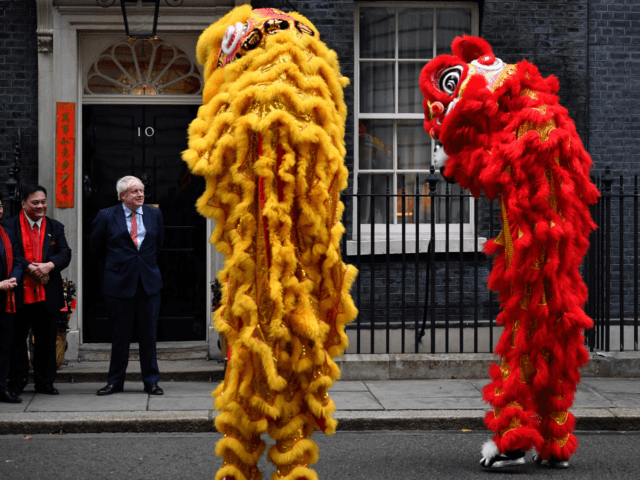Boris Johnson “loves China” and is on board with its imperialist Belt and Road initiative, according to extensive details about a phone call between him and Communist Party leader Xi Jinping released by a Chinese-government controlled news outlet.
The British prime minister spoke to Xi Jinping by telephone on Tuesday morning, discussing the Coronavirus outbreak and trade. While the tone of the official account of the call from Boris Johnson’s office gives little away, reports from Beijing emphasised Mr Johnson’s support for Xi and the Belt and Road economic project, a global push by China to distinctly tip the geopolitical landscape in their own favour.
Downing Street confirmed the call had taken place on Wednesday morning, in a vague readout that gave significantly less detail on the conversation and made no mention of the controversial Belt and Road initiative. While the prime minister’s office stated he “offered his sympathies for those affected by the outbreak of coronavirus in China”, a report by the Communist Party-controlled Global Times reports Mr Johnson expressed “on behalf of the British government and people… admiration” of the Chinese government’s response to the Coronavirus outbreak.
According to the Global Times, the British leader particularly praised China’s “speed and efficiency” in dealing with Coronavirus, despite claims by global health experts criticising the regime for reacting too slowly to the outbreak, and its insular and secretive instincts hampering a faster global response.
While the remarks on Coronavirus may be contested as compliment inflation meant to boost the damaged domestic public standing of Chairman Xi over the Coronavirus epidemic, or even a mistranslation, Boris Johnson’s alleged comments on economic integration with China through the One Belt One Road initiative may trigger more concern.
The South China Morning Post, a Hong Kong-based newspaper owned by Jack Ma, the richest man in China and a member of the Chinese Communist Party, reports Mr Johnson said: “Britain welcomes investment from Chinese companies… We would like to strengthen our cooperation with China under the Belt and Road Initiative.”
Breitbart London approached the prime minister’s office for further details about Wednesday’s call and the prime minister’s alleged comments about Belt and Road, but was told by a Downing Street press officer that no comment would be made.
The Belt and Road Initiative is an enormous Chinese government project to establish the nation not only as the preeminent manufacturing centre of the world, but one that also controls the means and norms of transport and trade through the 21st century. To this end, the Chinese government is pushing construction — undertaken by Chinese firms — of railways, roads, and ports across Europe, Asia, and Africa.
While these projects give China instant influence in the regions they are built in, often they are paid for with massive loans from Beijing which create debt traps — allowing the Chinese government either an opportunity to repossess critical national infrastructure in foreign nations, or giving Beijing massive influence over foreign governments as a major creditor. In one case, Kenya offered China parts of the Port of Mombassa as collateral on a loan for a $3 billion railway project which it later found it could not afford to repay.
Sri Lanka handed over the whole seaport of Hambantota to China in 2017 when it defaulted on a loan repayment. Greece — a European Union member state — has also seen its port of Piraeus nationalised by the Chinese state. The United States has called China’s approach to offering new infrastructure to nations in Africa and Asia “predatory”.
The news that Boris Johnson is allegedly ready to get behind Belt and Road comes amid growing controversy over Britain’s tilt towards China, and just days after claims in British newspapers emerged that the United Kingdom was in talks with the Chinese state to build the new High Speed 2 railway linking London with the north of England. Already a decade old and £8 billion down without having built a single mile of railway, the project is tens of billions of pounds over budget and years behind schedule.
Beijing has claimed it could build the railway in years, not decades, for less money, and at higher speeds than the present project promises. The British Department for Transport confirmed that “preliminary discussions” were underway.
The Johnson government’s approval of China’s Huawei technology firm — reckoned to be an arm of the Chinese state by critics — against the advice of the nation’s closest allies has also had a seismic impact on Anglo-American relations. As reported earlier this week, President Trump is claimed to have “slammed” down the telephone receiver in frustration with Prime Minister Boris Johnson while discussing Britain allowing China to participate building its future data network — potentially opening the UK and its allies to espionage on a massive scale.
While the United Kingdom has never officially signed up to the Belt and Road Initiative before, previous prime ministers have shown real enthusiasm to get close to Beijing. Former Conservative leader David Cameron welcomed Xi Jinping to London in 2015, fêting the Chinese leader, and after he left office became the leader of the United Kingdom’s Belt and Road investment fund.
Xinhuanet, a news network run by the Chinese government reported in 2018 that Mr Cameron said “the Belt and Road Initiative will bring new opportunities for bilateral cooperation”, and that Chairman Xi had congratulated the former prime minister on his “foresight” in developing closer UK-China ties during his time as leader.
Read More: China has a plan for your future and it’s called One Belt One Road.

COMMENTS
Please let us know if you're having issues with commenting.